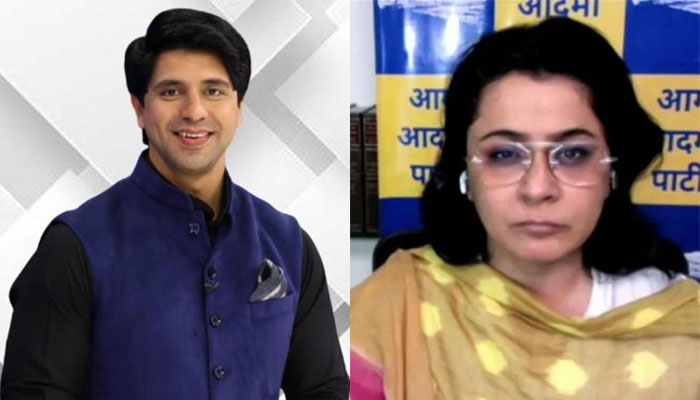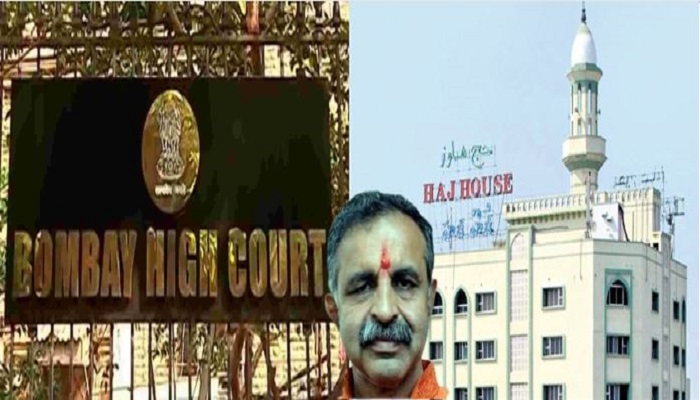‘Labelled as Mujahideen because I am a Muslim’: BJP’s Shehzad Poonawalla files complaint against AAP’s Priyanka Kakkar after debate. Read what happened

[ad_1]
On 26th July, Bharatiya Janata Party (BJP) national spokesperson Shehzad Poonawalla filed a police complaint against Aam Aadmi Party’s chief national spokesperson Priyanka Kakkar for labelling him as ‘Mujahideen’ during a debate on Republic TV. The incident took place on 25th July 2023, when Shehzad was part of a debate along with other party leaders, including AAP’s Kakkar, over Prime Minister Narendra Modi’s remarks on the newly formed I.N.D.I.A. alliance of the opposition parties.
Criminal defamation notice has been served upon AAP Chief National Spokesperson for calling Indian Muslim community & me an extremely objectionable hate inciting words during a Live TV debate by my lawyer Shri Namit Saxena ji
It has caused me mental and emotional trauma & has… pic.twitter.com/pCnHRshk5v
— Shehzad Jai Hind (@Shehzad_Ind) July 26, 2023
In his complaint, Shehzad says that Kakkar abused him and his faith by making extremely communally loaded remarks. He said during the course of the debate, Kakkar was unable to answer the questions raised by him and restored to labelling him as Mujahideen, which is now known for terrorism. He said, “She kept using that word against me merely because I am a Muslim. In the past, too, she has made such comments on-air and off-air against my faith against Islam and against Muslims in general; such comments only reflect the poisonous and hate-filled mindset of the Aam Aadmi Party towards Muslims.”
Today the AAP chief national spokesperson was asked full form of I.N.D.I.A
She obviously did not know it! After making a laughing stock of herself she resorts to the only thing she is capable of.. Without any hesitation makes a completely communal, abusive remark
Sadly,… pic.twitter.com/YXYz0CAkWg
— Shehzad Jai Hind (@Shehzad_Ind) July 25, 2023
He requested Noida Police to issue a show cause notice to the AAP seeking an explanation over derogatory remarks. He also requests to file a case against Kakkar under Sections 153A, 153B, 505, 295A and other relevant sections of the Indian Penal Code (IPC) so that such incidents of hate and communal speech do not happen in the future.
Shehzad sent a legal notice to Kakkar
Earlier, Shehzad Poonawalla shared on Twitter that he had sent a legal notice to Kakkar over the same. In the tweet, Shehzad said, “Criminal defamation notice has been served upon AAP Chief National Spokesperson for calling Indian Muslim community and me an extremely objectionable hate inciting words during a Live TV debate by my lawyer Shri Namit Saxena ji. It has caused me mental and emotional trauma & has incited hatred towards me. Earlier, I have taken up the said matter with National Minority Commission for constant hate speech by AAP.”
Police complaint against AAP Chief National Spokesperson has been filed in Noida , praying for speedy & quick action, against her hate speech directed at Indian Muslims in general & me in particular @Uppolice pic.twitter.com/hHVysAwRoU
— Shehzad Jai Hind (@Shehzad_Ind) July 26, 2023
In the notice, Shehzad’s lawyer asked AAP’s spokesperson to immediately withdraw all the allegations and aspersions made against Shehzad and tender an unconditional public apology to him via print, social and electronic media. He also asked her to immediately refrain and desist from ‘defaming, harassing, hampering the reputation of Shehzad and spreading any uncalled rumours and stop indulging in such activities. Failing to do this, a defamation case against Kakkar may be filed under sections 499 and 500 of the IPC. Kakkar was asked to reply to the notice in seven days.
Kakkar questioned if “Mujahideen” meant terrorist
Kakkar did not reply to the notice as of now. However, she did quote Shehzad’s tweet, where he shared a police complaint copy. She questioned if the words ‘Shehzad’, ‘Mujahideen’ or ‘Shehzad Mujahideen’ mean terrorist. She also questioned why he was allowed to refer to a Chief Minister as ‘Jihadi’ on national media and if it was okay to refer to a political opponent as ‘Shishu’.
1. Does “Shehzad” mean terrorist?
2. Does “Mujahideen” mean terrorist?
3. Does “Shehzad Mujahideen” mean terrorist?
4. Is the Complainant allowed to refer to a Chief Minister as “Jihadi” on national media?
5. The previous conduct of the Complainant.
6. Is it okay to refer a… https://t.co/mTpHH9w5xB— Priyanka Kakkar (@PKakkar_) July 26, 2023
Kakkar called Shehzad ‘Mujahideen’ during a debate
On 25th July, a debate was held by Republic TV following remarks by PM Modi where he slammed the opposition bloc during BJP parliamentary meeting. PM Modi argued that merely using the word ‘India’ would not work. Going ahead, he highlighted that a foreigner founded the colonising power East India Company, the same was the case with the Indian National Congress. He stressed that just like EIC, the opposition is presenting itself in the name of India. He added that even banned terror organisations like the Indian Mujahideen and Popular Front of India have also added the country’s name.
During the debate, Kakkar was unable to say the full form of the acronym I.N.D.I.A. to which Shehzad laughed. Irked by Shehzad, Kakkar started calling him Shehzad Mujahideen repeatedly. Not only Shehzad and Arnab Goswami, editor-in-chief of Republic TV, objected to it, but AAP’s alliance partner Congress’s leader Acharya Pramod Krishnam also raised objection in a lower voice directly to Kakkar.
Kakkar called Shehzad ‘Mujahideen’ and accused the Bharatiya Janata Party of not hoisting the National Flag for 52 years. She also called BJP the “Half Pant Party”. Notably, half pants used to be part of the official uniform of Rashtriya Swayamsevak Sangh (RSS) which is not a political party. Senior and prominent members of the organisation have been part of the BJP for a long time, including former Prime Minister Late Atal Bihari Vajpayee, LK Advani, PM Modi, Nitin Gadkari and others. However, hundreds of BJP members and leaders, including Shehzad Poonawalla, were never part of the RSS. So far, RSS has not reacted to the remarks passed by Kakkar.
Definition of the word “Mujahideen”
According to Britannica, the word Mujahideen means a Muslim who fights on behalf of the faith or the Muslim community, aka Ummah. It was also used as a personal name during the early Islamic period. However, in recent times the word Mujahideen has been associated with terrorist organisations, especially due to its early association with the Taliban in Afghanistan, which was a coalition of guerrilla groups that opposed the Soviet forces and eventually toppled the communist government during the Afghan War that was fought between the 1978 and 1972. Islamic terrorists broadly used the words Mujahideen and Jihad to refer to any Muslim groups engaged in terrorist activities.
The Islamic Emirate of Afghanistan laid down specific rules for Mujahideen that allow suicide attacks. According to ‘The Layha for the Mujahideen: an analysis of the code of conduct for the Taliban fighters under Islamic Law‘ by Dr Muhammad Munir, an Associate Professor in Islamabad, Pakistan, the code of conduct allows suicide attacks provided Mujahideen follow certain conditions. For example, the suicide bomber should be trained well to execute the mission. The attacks should be carried out only against high-value targets. Killing ordinary people and property damage “should be avoided as far as possible. The provincial authority must provide permission for the suicide attack.
Terrorist organisations in India that have the word ‘Mujahideen’
According to the Ministry of Home Affairs, there are seven terrorist organisations banned by the government of India that have ‘Mujahideen’ in their names. These organisations are Harkat-ul-Mujahideen, Hizb-Ul-Mujahideen, Al-Umar-Mujahideen, Jamiat-ul-Mujahideen, Indian Mujahideen, all its formations and front organisations, Tehreek-ul-Mujahideen and Jamaat-ul-Mujahideen Bangladesh.
[ad_2]
Source link



